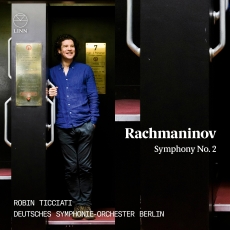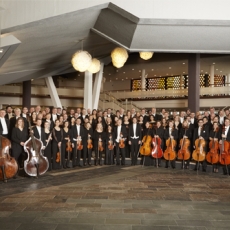Robin Ticciati & DSO Berlin - Rachmaninov: Symphony No. 2 - MusicWeb International [MC]
Robin Ticciati’s seventh album with the Deutsches Symphonie-Orchester Berlin (DSO Berlin) on the Linn label is Rachmaninov’s Symphony No 2 in E minor, recorded using the original, unabridged version of the score.
Ticciati initially became principal conductor of the DSO Berlin in the 2017-18 season and his contract has been extended through to 2027. This successful partnership has produced a steady flow of splendid recordings, some of which have been French works featuring the voice of mezzo-soprano Magdalena Kožená. A worthy example of this collaboration is the 2018 album of Ravel and Duparc, Aimer et mourir.
A landmark work in Rachmaninov’s symphonic output, the Symphony No 2 from 1906-07 comes roughly mid-way between two crucial events in his life. In 1897, Rachmaninov endured the humiliation of the disastrous premiere of his Symphony No 1 and in 1917 he departed Russia, never to return.
Owing to its length, it has been common for conductors to subject the score to cuts, but in this new release Ticciati conducts the ‘original unabridged version’ of the score that takes here sixty-three minutes to perform. The spacious opening movement begins with dark shading and a broodingly melancholic Largo where the fate motif is introduced. Decisively held together, the main body of the movement Allegro moderato with its intoning strings and longing winds doesn’t break the sad mood substantially, but alters it. The splendidly judged weight of orchestral sound gradually increases, evoking a stormier atmosphere. Marked Allegro molto, the second movement serves as a Scherzo and energises the character of the writing; although it is neither cheery nor overtly baleful, it communicates a sense of urgency.
Ticciati and his assured players clearly savour the magnificent, melting themes of the Adagio. This heavily rhapsodic and idyllic movement embodies the essence of love, reminding me strongly of Tchaikovsky’s late symphonies. Ticciati avoids the extremes of excess or underplaying the dance rhythms in the fourth movement Allegro vivace to ensure a level of positivity and jubilance that I respond to.
Savouring Rachmaninov’s opulent harmonies and passionate lyricism, the Berlin orchestra excels, achieving impressive heights of musicianship, but those who require extremes such as an overload of aggression in the faster movements and overindulgence in the slow movement should look elsewhere. Recording for Linn under studio conditions in the Großer Sendesaal, Haus des Rundfunks Berlin, the engineering team has achieved a satisfying sound quality.
Now this compelling new release on Linn provides fierce competition to my favourite recordings. In the hands of principal conductor Robin Ticciati, it feels unpretentious, insightful and firmly cohesive, while allowing the music to speak for itself.


